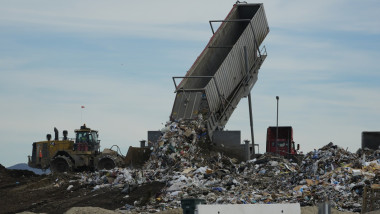California is forging ahead with food waste recycling. But is it too much, too fast?
Two years after California launched an effort to keep organic waste out of landfills, the state is so far behind on getting food recycling programs up and running that it’s widely accepted next year’s ambitious waste-reduction targets won’t be met.
Over time, food scraps and other organic materials like yard waste emit methane, a gas more potent and damaging in the short-term than carbon emissions from fossil fuels. California’s goal is to keep that waste from piling up in landfills, instead turning it into compost or biogas.
Everything from banana peels and used coffee grounds to yard waste and soiled paper products like pizza boxes counts as organic waste. Households and businesses are now supposed to sort that material into a different bin.
